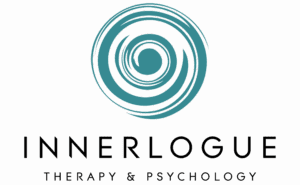Bringing life into the world is often portrayed as one of life’s most joyous milestones. But for many new and expecting parents in Calgary, this period can also be marked by emotional struggles and overwhelming anxiety. These are not uncommon experiences — in fact, they may be signs of perinatal or postnatal depression, two serious yet treatable mental health conditions. The Government of Canada’s 2018/2019 survey on Maternal Mental Health showed that an average of 23% of Canadian women experienced postpartum depression alone. Rates are higher for marginalized people.
At Innerlogue, we support individuals and families navigating the challenges of pregnancy, childbirth, and early parenthood. In this blog post, we explore the signs, causes, and treatment options for perinatal and postnatal depression, while offering guidance on when and how to seek support in Calgary.
What Is Perinatal and Postnatal Depression?
Perinatal depression refers to depression that occurs during pregnancy (antenatal depression) and after childbirth (postnatal or postpartum depression). It affects not just mothers, but can also impact partners and adoptive parents.
- Postnatal depression typically develops within the first year after childbirth, although it can appear anytime after delivery.
- Perinatal depression includes both prenatal and postnatal depression, acknowledging the full spectrum of mental health challenges around the childbearing experience.
These conditions are more than just the “baby blues.” While it’s normal to feel emotional or overwhelmed for a few days after birth, postnatal depression is deeper and longer-lasting. Without professional support, it can significantly affect a person’s well-being and ability to care for their child.
Common Symptoms of Perinatal and Postnatal Depression
If you or someone you love is experiencing the following symptoms for more than two weeks, it may be time to speak to a mental health professional in Calgary:
- Persistent sadness, emptiness, or hopelessness
- Severe mood swings or irritability
- Loss of interest in previously enjoyed activities
- Changes in appetite or sleep patterns
- Excessive worry or anxiety, especially about the baby
- Feelings of guilt, shame, or inadequacy as a parent
- Difficulty bonding with the baby
- Thoughts of self-harm or harming the baby (seek immediate help)
It’s important to note that postpartum anxiety, postpartum OCD, and postpartum psychosis are also conditions that may arise after childbirth and require professional care.
What Causes Perinatal and Postnatal Depression?
There is no single cause of perinatal depression. Instead, a combination of biological, emotional, and environmental factors may be involved:
- Hormonal changes after childbirth
- Personal or family history of depression or anxiety
- Traumatic birth experience
- Sleep deprivation
- Lack of social or partner support
- Financial stress or work-life pressures
- Isolation, especially common in urban settings like Calgary
In the rhythm of Calgary’s fast-paced life, where skyscrapers rise but extended family may feel far away, the journey into parenthood can feel unexpectedly lonely. Amid the hum of daily responsibilities, isolation can quietly take root. Society often paints childbirth in golden hues — a time of joy, wonder, and perfect bliss. Yet for those who find themselves struggling, this idealized picture can deepen the silence, making it even harder to speak the truth: that it’s okay not to feel okay, and that reaching out for help is a brave and beautiful beginning.
Perinatal Mental Health in Calgary: The Importance of Early Intervention
In Calgary, access to perinatal mental health services is growing, but many individuals still suffer in silence due to stigma or lack of awareness, and free mental health services can warrant long wait times. Early intervention can make a significant difference. The sooner you seek support, the sooner you can start to feel better.
At Innerlogue, we work with clients who may feel unsure about their symptoms. We offer a safe, nonjudgmental space to explore your thoughts and feelings, and we guide you through a plan tailored to your specific needs.
How Is Perinatal and Postnatal Depression Treated?
The good news is that perinatal and postnatal depression are highly treatable. The most effective treatment plans often combine several approaches:
- Therapy and Counselling
Therapeutic support, such as Cognitive Behavioural Therapy (CBT) or Interpersonal Therapy (IPT), is often the first line of treatment. These therapies help individuals challenge negative thought patterns, build coping skills, and process difficult emotions. At our Calgary clinic, our therapists are trained in evidence-based approaches for perinatal mental health.
- Support Groups
Connecting with other parents going through similar experiences can reduce feelings of isolation. In Calgary, several local organizations and clinics (including ours) offer perinatal mental health support groups.
- Medication
In some cases, antidepressant medications may be recommended, especially if symptoms are severe. Your doctor or psychiatrist will work closely with you to find a treatment that’s safe during pregnancy or breastfeeding.
- Lifestyle and Self-Care
While professional support is essential in treating postpartum depression, small daily habits can also play a meaningful role in your recovery. Prioritizing rest, nourishing your body with balanced meals, moving gently through walks or light exercise, and carving out moments for yourself — even just a few quiet minutes — can help restore emotional balance. Connecting with loved ones, practicing mindfulness, and being kind to yourself are simple yet powerful acts of self-care that support healing during this tender time.
When and Why to Seek Help
If you’re navigating the challenges of postpartum depression, know that you’re not alone — and that seeking help is not a sign of weakness, but a powerful act of care for both yourself and your child. When you prioritize your mental well-being, you’re also creating a healthier, more nurturing environment for your little one to grow. Children thrive when their caregivers are supported and emotionally well, and taking steps toward healing is a meaningful way to model resilience and self-compassion from the very start. You deserve support, and it’s okay to ask for it.Reach out if:
- Your emotions are interfering with daily life
- You’re struggling to bond with your baby
- You feel ashamed, guilty, or overwhelmed
- You’re experiencing thoughts of harm (to yourself or others)
Immediate help is available through Calgary’s Distress Centre (403-266-4357) or Health Link 811.
You Are Not Alone
Experiencing depression during or after pregnancy doesn’t mean you’re a bad parent — it means you’re human. Many Calgarians go through this, and many recover fully with the right support.
If you or someone you love is dealing with perinatal or postnatal depression in Calgary, please reach out. Healing is possible, and we are here to help you every step of the way.







